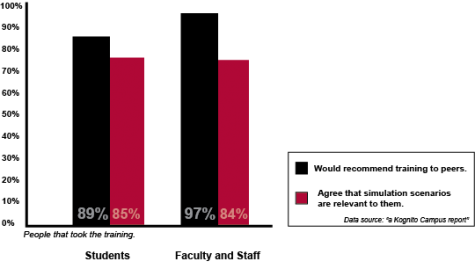Wellness Center provides online mental health training for students
October 1, 2020
Not everyone is prepared to deal with a friend having a mental health crisis. That is why the Wellness Center teamed up with a vendor called Kognito Campus to offer a virtual game that teaches students how to approach difficult conversations about mental health.
Kognito Campus is a vendor the Wellness Center is already familiar with. Before using Kognito Campus to provide students with mental health training, it was used to train faculty members on how to work with student veterans. Wellness Center Director Marissa Howat believes expanding the license to include mental health training for students is beneficial.
“Students are more likely to reach out to a friend before they make an appointment with Student Counseling Services,” Howat said. “We are really hoping to increase the number of ‘gatekeepers’ at CWU, people who are trained about signs and symptoms of mental health and feel confident having conversations about resources with others.”

The training is called At Risk and it is in the form of a role-playing game. Howat said the Wellness Center chose this type of training because role-playing helps people learn.
The game starts by giving players a list of four friends. Then, it shows the behavior of these friends over time, and it is the player’s job to determine which of them is struggling with mental health. After determining which friend is in trouble, the player goes to the friend’s home to check on them. The player is then given a set of phrases to choose from to encourage the friend to open up and reach out for help.
There is a virtual assistant in the game that offers advice if players don’t know how to respond to the in-game scenarios. The game also has an undo button, so if the player selects something that makes the friend in crisis defensive, they can undo what they’ve said and try again.
In a real life situation where you are encouraging a friend to reach out for help and say something that makes them defensive, Howat recommends apologizing and letting the friend know that you are concerned about them. However, people shouldn’t assume someone having a bad week is struggling with their mental health, she said. If it goes on for a long period of time, it may be time to express concern, and the same goes for students feeling down themselves, Howat said.
“It’s hard to tell,” Howat said. “If you’ve been feeling low for a while and it’s affecting your daily life, then we want you to reach out.”

Howat also said students shouldn’t try to force their friends to go to counseling if they don’t want to. Instead, she said to listen to what they have to say.
According to Howat, since the Wellness Center began offering At Risk, 147 faculty and staff as well as 314 students have gone through the training. Trainees are asked to complete a survey on how they feel about the training before and after completing it.
According to a Kognito Campus report, 89% of students who took the training would recommend it to fellow students. That number increases to 97% for faculty or staff. Eighty-five percent of students said they agree the simulation scenarios are relevant to them and 84% of faculty and staff agreed.
“Anxiety and depression are treatable conditions,” Howat said. “Earlier intervention and treatment are associated with better outcomes. We hope that having more people trained leads to more people getting support, earlier.”
Students can access this online mental health training by going to https://www.kognitocampus.com/. The second step is to create an account with your CWU email and then enter the access code. The access code is CWUARUS. This training will be available until 2022.

According to the Kognito Campus website, these simulations have been licensed by 500 health, education, nonprofit and government organizations. The training they provide is meant to help people practice how they would approach a mental health discussion.
“Kognito creates digital experiences that prepare people for the conversations that matter most,” Kognito Campus’ website reads.


